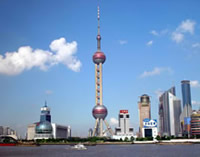|
|


ADVERTISEMENT
Buy Your own advertising
spaces!
.
Download Adobe Acrobat Reader to open [PDF] files.
Recent Visitors
A Long Love Affair
2009. 10 May
(bjreview.com) It is no secret that Shanghai's drive to hold a successful World Expo in 2010 has been generously backed with human resources and money by the Central Government. But it might come as a surprise to Westerners that Shanghai has long had a fascination with the event that extends back well into the 19th century.
The World Expo's beginning, which debuted in London in 1851, coincided with China's first attempts to reach out by Li Tiangang
by Li Tiangang
Since the founding of the Republic of China in 1911, chambers of commerce, mainly composed of Shanghai merchants, sponsored and organized the construction of China's World Expo pavilions. During this period, Shanghai's factories, farms, stores, research institutes and churches were invited to donate exhibition items to the endeavor.
While designing and building the pavilions, Shanghai residents looked forward to one day hosting the event in the early 20th century. This desire was given form in literature from the period. In 1902, Liang Qichao, one of the most influential scholars at the turn of the century, depicted a future in which the city would host the grand Shanghai Expo 60 years thence. In his work, the whole city became the site for the grand event, which even hosted forums and seminars on natural and social sciences. Then in 1905, Shanghai-based novelist Wu Jianren rewrote the 18th-century masterpiece The Story of the Stone, where the novel's hero Jia Baoyu visited a World Expo staged in the city's Pudong area. In 1910, another Shanghai novelist, Lu Shi'e, predicted in his novel New China that the World Expo would come to Shanghai 100 years from then, which now appears to be a prescient prediction.
In the last 150 years, Shanghai has made a name as the most open to the outside world among Chinese cities. A welcoming attitude toward globalization is in the blood of Shanghai residents. Most people in the city believe that only after the city joins the global economic system can they obtain opportunities to start businesses and develop themselves. And this enthusiasm also explains the city's love affair with the World Expo.
History professor Jeffrey Wasserstrom with University of California, Irvine, who has been following Shanghai's preparations for the 2010 Expo, recently published a book called Global Shanghai, 1850-2010. In this book, Wasserstrom regards the World Expo 2010 as an important mark of Shanghai's re-globalization. He praises the city's efforts to retake the center stage and calls Shanghai a "futuristic city" in the 21st century.
The Expo's 4-square-km site will be located on the banks of the Huangpu River between the two landmark Nanpu and Lupu bridges. Running several hundred meters wide at the Expo site, the Huangpu River defines Shanghai as much as the Thames defines London, the Seines defines Paris or the Hudson defines New York City. Besides providing grand views for the city's visitors, the river was also a cradle of China's early industrialization. A 150-year-old shipyard on the river was moved to make way for the Expo. The old site of Jiangnan Shipyard, a ship building factory founded in 1865 that built several 10,000-ton ships for the United States, including the Mandarin, Celestial, Oriental and Cathay, has been transformed into a major event venue. The shipyard is building a new home on Changxing Island near the mouth of the Yangtze River, which will soon become the world's largest shipyard. After serving in the Expo, the shipyard's old site will become a museum of Shanghai's early industrialization, exhibiting Shanghai's prominence in the world's early globalizing economy and the city's long history as an international trading port.
People in political and business circles care deeply about the coming World Expo's economic benefits for Shanghai and China. A large amount of money has been pumped into constructing the Expo's facilities, which comes from government capital, company sponsorships, income from franchise fees and land development profits. Governments of participating countries will pay for the construction of their national pavilions. Ticket sales are also a major income source for the host city. During the Expo's six months, an estimated 70 million visitors will come to Shanghai, purchasing tickets at the base price of 160 yuan ($23.5). Other income sources include Expo-related tourism, accommodation, exhibitions, trade fairs, retailing, catering, entertainment, advertising, logistics and financial services. The Expo's organizers are confident that they will not lose money by hosting the pageant. Vincente Gonzalez Loscertales, Secretary General of the Paris-based Bureau International des Expositions, said that he expects the Shanghai World Expo to become a historic event and the first such to turn a profit.
Due to different calculation methods, it is difficult to give an accurate figure of the Expo's total cost. One calculation estimates that if investment on the city's infrastructure of the Expo site is included, the total cost could amount to 400 billion yuan ($58.8 billion). Shanghai has built new airports, subways and hotels in the run-up to the Expo. By 2010, new city subways will total 400 km. Another major city infrastructure project is a traffic hub near Hongqiao International Airport, which connects high-speed railway stations, intercity rail stations, subway stations and airport terminals. Huge investment in these projects has become an important impetus to China's economic growth, which is particularly precious set against the global economic slowdown. Besides the upgraded city infrastructure, other legacies of the Expo will include cultivating a large number of residents with international visions and accelerating the development of a local services sector.
Compared with its material legacy, the event's spiritual legacy will be even more significant. Between April and October 2010, 70 million people from across the world will meet in Shanghai, China's "futuristic city," and exchange their views on the topic of "better city, better life," the Expo's theme. From this perspective, the Expo is nothing less than a catalyst for humanity's integration.
The author is a Fudan University professor and author of several books on Shanghai's history
Source: www.bjreview.com

